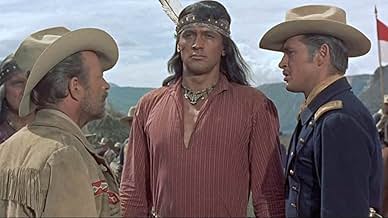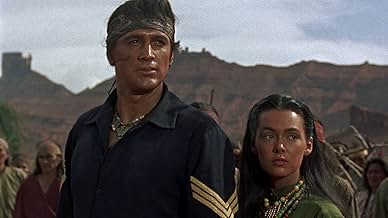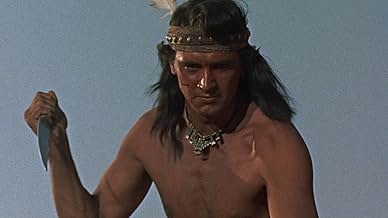NOTE IMDb
5,6/10
1,1 k
MA NOTE
Lorsque Cochise, chef apache pacifiste, meurt, les Apaches Chiricahua sont déchirés: suivre le fils pacifiste de Cochise, Taza, ou suivre l'Apache renégat, le belliqueux Geronimo.Lorsque Cochise, chef apache pacifiste, meurt, les Apaches Chiricahua sont déchirés: suivre le fils pacifiste de Cochise, Taza, ou suivre l'Apache renégat, le belliqueux Geronimo.Lorsque Cochise, chef apache pacifiste, meurt, les Apaches Chiricahua sont déchirés: suivre le fils pacifiste de Cochise, Taza, ou suivre l'Apache renégat, le belliqueux Geronimo.
- Réalisation
- Scénario
- Casting principal
Rex Reason
- Naiche
- (as Bart Roberts)
Eugene Iglesias
- Chato
- (as Gene Iglesias)
Richard H. Cutting
- Cy Hegan
- (as Richard Cutting)
Bradford Jackson
- Lt. Richards
- (as Brad Jackson)
Seth Bigman
- Indian Man
- (non crédité)
Avis à la une
When Cochise (played briefly by an uncredited Jeff Chandler) dies, his son Taza (played by Rock Hudson) takes over as chief of the Chiricahua Apaches and tries to maintain the peace. Followers of Geronimo wish to start fighting again.
It's a thoughtful script, and director Douglas Sirk claimed it was his favorite of his movies; he had always wanted to make a western. There are some issues with the movie, some caused by technical issues, and most by Rock Hudson's rather wooden acting. He's got two settings, thoughtful and angry, and that performance makes him, as the central character, seem rather stupid, especially given the more nuanced performances afforded the men playing cavalrymen.
The technical issues can be understood by knowing this was originally shot for 3-D, but released in a flat version. The compositions meant to showcase the depth of shot stick out like a sore thumb, lending a peculiarly film noir look to them. While Russel Metty's camerawork is exemplary in the big-screen shots of Utah, many of the more intimate scenes show up in a peculiarly dark and grey light.
The script by George Zuckerman keeps things moving along, but the problems of performance and camerawork lay heavily on this movie. Sirk and producer Ross Hunter abandoned the western for a series of glossy soap operas.
It's a thoughtful script, and director Douglas Sirk claimed it was his favorite of his movies; he had always wanted to make a western. There are some issues with the movie, some caused by technical issues, and most by Rock Hudson's rather wooden acting. He's got two settings, thoughtful and angry, and that performance makes him, as the central character, seem rather stupid, especially given the more nuanced performances afforded the men playing cavalrymen.
The technical issues can be understood by knowing this was originally shot for 3-D, but released in a flat version. The compositions meant to showcase the depth of shot stick out like a sore thumb, lending a peculiarly film noir look to them. While Russel Metty's camerawork is exemplary in the big-screen shots of Utah, many of the more intimate scenes show up in a peculiarly dark and grey light.
The script by George Zuckerman keeps things moving along, but the problems of performance and camerawork lay heavily on this movie. Sirk and producer Ross Hunter abandoned the western for a series of glossy soap operas.
Don't get me wrong.I've always been a big fan of Deltlef Sierck (Douglas Sirk in America)and most of his melodramas are among my all time favorites : "A time to live and a time to die ","All that Heaven allows" "Magnificent obsession" " Tarnished angels" "Written on the wind" plus those with Zarah Leander in Germany not to forget his final effort ,the remake of "imitation of life".
THis remake was drastically different from Stahl's version:the black servant Delilah became Annie and the only thing she could expect in life was a beautiful funeral.In Stahl's version (and in Fannie Hurst's novel) she was a businesswoman's associate ,in Sirk's screenplay she stayed the good servant -not very far away from GWTW's Mamma-who knew her place.
Still with me?I do think that,in spite of Sirk's storyteller qualities and good scenes (the discovery of the bruises on Barbara Rush's back),"Taza" is also a reactionary work .Taza (who in real life died of pneumonia two years after his dad)predates Annie in "Imitation" :he is the good Indian,who knows his place ,who (this is amazing) dresses like them ,who rebels against his people's customs and even fights them;on the other hand ,Geronimo (and his allies) plays the role of the villain : "we were hunters, warriors,we won't be breeders ".After all ,the white men are taking their land and sending them to reservations:his rebellion makes sense.
Rock Hudson,who was Sirk's favorite actor (his best parts were certainly "All that Heaven allows" and "Magnificent Obsession" -another remake of a Stahl's work-) ,is not well cast as an Indian.And what about Barbara Rush as a squaw?Debra Paget was acceptable ("Broken Arrow"),she is not.
THis remake was drastically different from Stahl's version:the black servant Delilah became Annie and the only thing she could expect in life was a beautiful funeral.In Stahl's version (and in Fannie Hurst's novel) she was a businesswoman's associate ,in Sirk's screenplay she stayed the good servant -not very far away from GWTW's Mamma-who knew her place.
Still with me?I do think that,in spite of Sirk's storyteller qualities and good scenes (the discovery of the bruises on Barbara Rush's back),"Taza" is also a reactionary work .Taza (who in real life died of pneumonia two years after his dad)predates Annie in "Imitation" :he is the good Indian,who knows his place ,who (this is amazing) dresses like them ,who rebels against his people's customs and even fights them;on the other hand ,Geronimo (and his allies) plays the role of the villain : "we were hunters, warriors,we won't be breeders ".After all ,the white men are taking their land and sending them to reservations:his rebellion makes sense.
Rock Hudson,who was Sirk's favorite actor (his best parts were certainly "All that Heaven allows" and "Magnificent Obsession" -another remake of a Stahl's work-) ,is not well cast as an Indian.And what about Barbara Rush as a squaw?Debra Paget was acceptable ("Broken Arrow"),she is not.
Universal joined the parade of film studios that wanted to cash in on the popularity of Indian chiefs during the 1950s. This western followed the familiar formula of war and peace, reservation vs. warpath story lines, trigger happy soldiers and renegade Indians. Rock Hudson stars as the obedient, peace-loving son of Cochise in this Arizona saga but his brother opposes the chief's death-bed wish and schemes with other Indians to break free to raid and plunder. That is essentially the plot here, with nothing new to offer fans of this genre. The movie has enough action and scenic vistas to maintain interest but also looks like it was filmed on a shoestring budget. Hudson and Barbara Rush make a fetching couple and the supporting cast is good but the film lacks the polish of other Universal westerns of this period.
Beware folks, because you deal here with the only western that director Douglas Sirk will ever give to us. But he has for this western his fetish actor Rock Hudson, so he is not totally alone in unknown territory. This is an agreeable piece of work, not worse nor better than other Universal westerns of this period. George Sherman could have done it too, and in the very same manner. By chance, Jeff Chandler, who played Cochise in THE BROKEN ARROW - for Twentieth Century Fox - was in the meantime "transfered" to Universal Studios, so it was easy for the production to use him as a dying Cochise in the beginning. And this is not a spoiler !!!!! Rock Hudson is OK, it also could have been worse. Good western.
One might have expected a lot more from Douglas Sirk in this, his single Western. Beautifully shot by Russell Metty who worked extensively with Sirk, it's a very routine Western of no great interest.
Before Sirk hit his stride with the great melodramas he tried his hand at light romantic comedy and costume drama with pleasing if not spectacular results. He brought little if anything at all to the Western.
Perhaps more than anything it's an important rung in the ladder of elevating Rock Hudson towards stardom which would come with Sirk's next film "Magnificent Obsession".
Hudson is adequate in the role, but that's hardly difficult amongst some truly wooden performances. All in all something of a low point in the amazing 50's career of Douglas Sirk.
Before Sirk hit his stride with the great melodramas he tried his hand at light romantic comedy and costume drama with pleasing if not spectacular results. He brought little if anything at all to the Western.
Perhaps more than anything it's an important rung in the ladder of elevating Rock Hudson towards stardom which would come with Sirk's next film "Magnificent Obsession".
Hudson is adequate in the role, but that's hardly difficult amongst some truly wooden performances. All in all something of a low point in the amazing 50's career of Douglas Sirk.
Le saviez-vous
- AnecdotesDouglas Sirk often cited this film as the favorite of his own films since he always wanted to make a Western.
- GaffesThe official U.S. flag of 1872, the year the story takes place, did have 37 stars in five rows, however it consisted of a top and bottom row of eight stars with three rows of seven stars in between (8-7-7-7-8), not alternating rows of seven and eight (7-8-7-8-7) as the one in the film has.
- ConnexionsFeatured in Rock Hudson's Home Movies (1992)
Meilleurs choix
Connectez-vous pour évaluer et suivre la liste de favoris afin de recevoir des recommandations personnalisées
- How long is Taza, Son of Cochise?Alimenté par Alexa
Détails
- Date de sortie
- Pays d’origine
- Langues
- Aussi connu sous le nom de
- Taza, Son of Cochise
- Lieux de tournage
- Devils Garden, Arches National Park, Utah, États-Unis(cavalry ambush scene)
- Société de production
- Voir plus de crédits d'entreprise sur IMDbPro
- Durée1 heure 19 minutes
- Rapport de forme
- 2.00 : 1
Contribuer à cette page
Suggérer une modification ou ajouter du contenu manquant

Lacune principale
By what name was Taza, fils de Cochise (1954) officially released in India in English?
Répondre


































